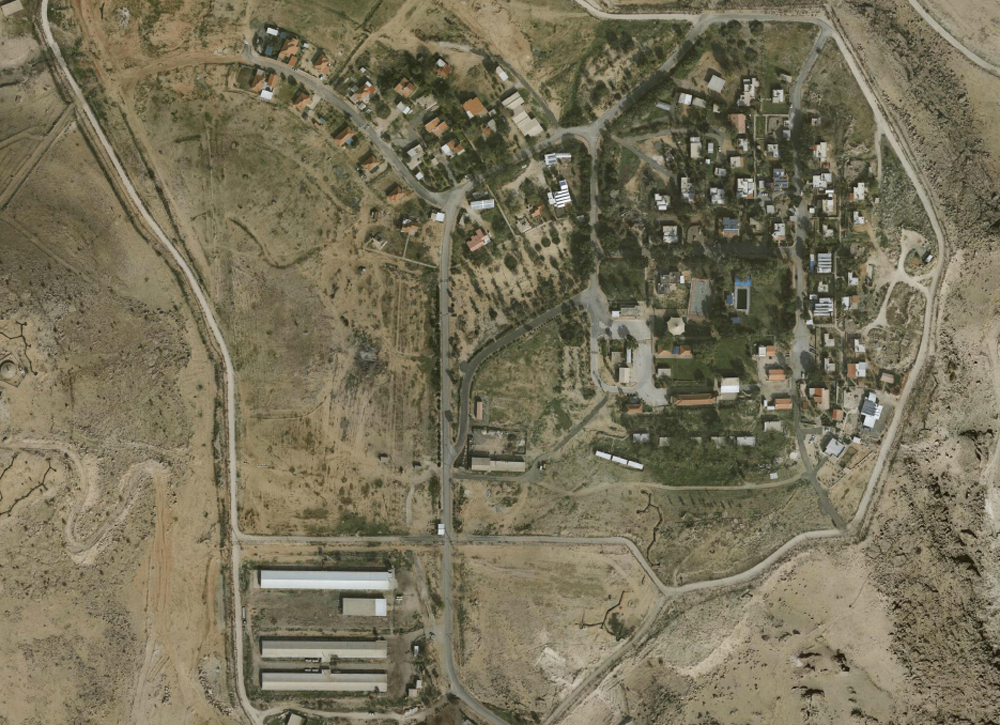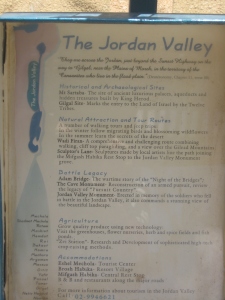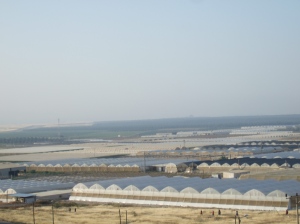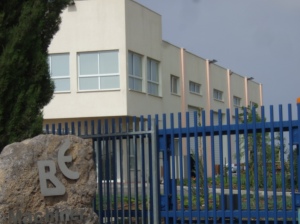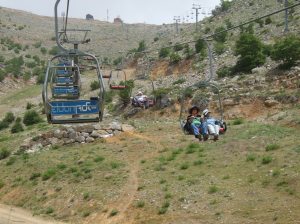Hadiklaim in the Jordan Valley
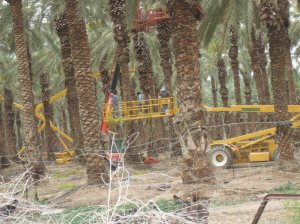
Hadiklaim is an Israeli date growers cooperative which deals with several major supermarkets in the UK, including Sainsburys, Marks and Spencer, Tesco and Waitrose (although the Co Op and Marks and Spencer maintain that they only stock Hadiklaim products from 1948 Israel). The company boasts that it exports to 30 countries (see http://www.hadiklaim.com/company_customers.asp). Tesco and Marks and Spencer branded dates are Hadiklaim produce.
The Hadiklaim cooperative includes date growers from 1948 Israel, mostly the South, and from the settlements in the occupied Jordan Valley. Hadiklaim’s website portrays the company as one which deals only with 1948 Israel; listing growers in Beit Shean, the Kinneret, the Arava, Eilat and (ambiguosly)’the Dead Sea region’. However, the company also exports from the Israels settlements in the Jordan Valley. Hadiklaim’s statements in the Israeli Hebrew language media are markedly different – the companies CEO has stated in YNet that the occupied Jordan Valley is an important area for Hadiklaim. (more…)
The Jordan Valley meeting point: The Jewish National Fund's racist alternative reality
If you are a follower of this blog you will have read a lot about the Jordan Valley -an area that comprises almost 30% of the West Bank. Because of its fertile land and border with Jordan, it is under urgent threat of annexation by Israel, who are issuing statements about their claim to the land with alarming frequency. In March this year Benjamin Netanyahu officially announced that “Israel will never cede the Jordan Valley” and since then the Palestinians there have been met with increasing repression. Only during the last few weeks, the Israeli Occupation Forces entered the Palestinian village of Al Farisiya and demolished 23 houses, leaving over 100 people homeless. When the villagers rebuild some of the destroyed structures the army returned to the area and yet again razed it to the ground
44% of the land in the Jordan Valley is controlled by closed military zones and 50% by the 37 illegal settlements -leaving the indigenous Palestinian population in control of a mere 6% of their land. Around 7000 illegal Israeli settlers and 50.000 Palestinians live in the parts of the valley which are on the Palestinian side of the Green Line. An uninformed visitor could be forgiven for thinking that the numbers were reversed; It is entirely possible to take a bus straight from inside Israel and along the Israeli controlled Road 90 through the valley, seeing only settler greenhouses with their lush, irrigated crops. This is a façade that Israel work cold-heartedly to promote.
Visiting the Jordan Valley Meeting Point – an Israeli run rest stop and tourist centre along Road 90- is a disturbing and slightly surreal experience for anybody who knows what the real Jordan Valley, and life for its Palestinian communities, is like. Entering the meeting point area feels like joining some ethnically cleansed zone in a Zionist alternative universe, as everything Palestinian has been removed from view. Any tourist, or conscripted Israeli teenage soldier, stopping off there for a Coke and falafel will be presented with a version of the truth designed to brainwash them and airbrush anything Palestinian from the valley. The information points provided describe historical and archaeological sites, attractions and tour routes, state of the art agricultural technologies and Israel’s “battle legacies” in the area. Inviting tourists to join settler organised Jeep trips and walking tours, they highlight the possibilities to follow migrating birds and appreciate blossoming wild flowers in a stunning landscape. What they fail to mention, however, is that no Palestinian has the freedom to enjoy any of these things as all their villages are surrounded by closed military zones and they are prevented from taking a step out of line. (more…)
Companies trading from Ro'i settlement in the Jordan Valley
As part of Corporate Watch’s efforts to map settlement exports from the Jordan Valley, we visited the illegal Israeli settlement of Ro’i earlier this year.
Established in 1976, Ro’i is a “typical” Jordan Valley settlement in that it has a low population (of less than 150 settlers), but has stolen large areas of land from the indigenous Palestinian population. With its private security, army protection and rows upon rows of greenhouses, Ro’i poses a challenge to the existence of Bedouin communities such as nearby Al Hadidya and Ras-Al Ahmar, who are under constant threat of house demolitions and army harassment aimed at the ethnic cleansing of bedouin from the area. The Israeli’s described these communities as a “security threat” to the settlers.
Al Hadidya is located just next to Ro’i, which was partially built on their land, and inhabitants have to more or less drive through the the outskirts of the settlement in order to reach their home. Any company trading from Ro’i, or importing their produce, are directly responsible for the very real possibility of Al Hadidya’s forced extinction.
(more…)
Bnei Yehuda industrial zone
The Bnei Yehuda industrial area is a business park connected to the Israeli Moshav settlement Bnei Yehuda in the occupied Golan. As is the case with all Israeli industrial zones, businesses operating in Bnei Yehuda enjoy preferential tax rates and other benefits and, in doing businesson occupied territory, ensure the profitability and sustainability of the settlement itself (see our previous report http://www.corporatewatch.org/?lid=3477 ). Whilst most of the businesses trading from Bnei Yehuda, such as the skin care company Avanova (http://www.avanova.co.il ) and Kosher caterers Buffalo, seem to cater for the settlers and wider Israeli market, Corporate Watch found one company with wider international connections. BE Machinery, one part of the larger Beth El Industries, specialise in machinery and processing plants for the food industry or, in their own words “complete automation and integrated IT solutions for the food, dairy, beverage, pharmaceutical and cosmetic industries.” Their mother company Beth El is a multi faceted business which, like so many other Israeli enterprises, make most of their business from the production of various military and “safety” equipment, including bomb shelters, filtration systems and vehicle components. According to The Israel Export and International Cooperation Institute’s web-site, where Beth El’s profile is located in the Aerospace and Homeland Security section, they are a supplier to many NATO forces throughout Europe, the Middle East and the far East. The UK is listed as both an importing and exporting partner of Beth El.
As is common amongst companies which trade in the settlements, BE Machinery are registered inside Israel, at the address if Beth El Industries: Food Processing Department, 1 Avshalom Road,
P.O. Box 166, Zikhron Yaaqov 30951, Israel
info@be-machinery.com http://www.be-machinery.com/
phone: 0097246601717 Fax: 0097246601919 (more…)
Empowering the occupiers: ELIN Seilbahntechnik
Mount Hermon, located in the Occupied Golan, is trying hard to present itself as a unique destination for Israelis and foreign tourists alike. Promoted as the only ski resort in Israel, the mountain slopes of the Hermon is busiest in the winter, when visitors can participate in various skiing activities. In the summer it is popular with hikers, and a new bike track was recently opened for adventurous cyclists. Although Israel’s occupation of the Golan is sometimes less visibly repressive than in the West Bank -most notably through the lack of checkpoints- it would be a mistake for any holiday makers to fool themselves into believing that a trip there does not make them complicit in the same brutal occupation. Despite its proximity to the Syrian Druze town Majdal Shams, any business on Mount Hermon is tightly controlled by the Israeli mountain top settlement Neve Ativ. Neve Ativ is build on the land of the Syrian village of Jubata ez-Zeit, completely razed by the Israeli’s after six day war.
(more…)
Still doing Israel's Dirty Work: Veolia's Tovlan landfill in the Jordan Valley
Video of work continuing at the Tovlan site here
As Corporate Watch has previously reported (see http://corporateoccupation.wordpress.com/2010/03/31/veolia-taking-out-israels-trash/ and http://corporateoccupation.wordpress.com/2010/01/28/veolias-dirty-business-the-tovlan-landfill/) Veolia run the Tovlan landfill site in the Occupied Jordan Valley as well as provide rubbish collection services to numerous settlements in the area. Whilst the company’s involvement in the East Jerusalem tram line project has gained world wide infamy, their operations in the Jordan Valley have as yet not got them into as much trouble. However, their very direct support of the settlement infrastructure in one of the most vulnerable areas of Palestine prove that they are more than willing to profit from Israel’s brutal occupation as long as they can get away with it. In recent correspondence with critics of their conduct Veolia have downplayed their business in the Jordan Valley, claiming that their site there is no longer operating. On a recent trip there Corporate Watch decided to pay them another visit to see if we could prove them wrong…
(more…)
Why the only way to trade ethically is to divest from Israel – an update on EDOM and Valley Grown Salads
After Corporate Watch sent an open letter to Valley Grown Salads (VGS), which has a 20% share in the Israeli company EDOM UK, we were immediately contacted by Jimmy Russo – the company’s director who is also the chairman of EDOM. Claiming that we had got our facts wrong, he was eager to dispute our claim that EDOM had been seen packing vegetables in the illegal settlement of Tomer in the Jordan Valley. Expressing concern that his company could become a ‘target’ as a result of any settlement connections, he emphasised that VGS would not trade with growers who used child labour or breached labour regulations and indicated that EDOM and VGS would not trade with the settlements in the future. Through written correspondence and a number of phone calls we have since attempted to get to the truth about EDOM’s business in the settlements and inside Israel, asking Russo to explain the various pieces of evidence that point to exports from Tomer. (more…)
Working for Shamir Salads in Barkan industrial zone
The Barkan industrial zone, part of the Ariel settlement block, was founded in 1982 and is the second largest industrial zone in the West Bank. As all industrial zones connected to settlements, businesses operating there receive generous tax reductions from the Israeli government. During the last few years Barkan has been making the BDS headlines through campaigns against companies such as Mul-T-Lock (Assa Abloy) and Beigel and Beigel. One company located in Barkan is the Israeli owned kosher food distributor Shamir Salads (51% owned by Willi-Food) who, according to their web-site, export their produce to Russia, the UK, Holland, Denmark, France, Ukraine, Canada and the US. Specialising in ready made salads and various houmous and aubergine dips, they also service “several food distribution routes for the Israeli Defence Forces”. Shamir Salads have been exposed as deliberately mislabelling their settlement produce, with the latest evidence being produced by Gush Shalom, an Israeli group calling for a boycott of Israel’s settlements, in March, when they found Shamir Salads products in the Netherlands labelled as Israeli despite being made in their Barkan facility (see http://zope.gush-shalom.org/home/en/channels/press_releases/1269703726/ ).
(more…)
